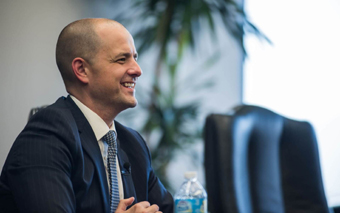
Image courtesy of Evan McMullin for President
McMullin Hopes to Deny Both
Clinton & Trump Victory
| published October 24, 2016 |
By Keith H. Roberts, Thursday Review contributor
Though his name is not a household word, and his candidacy considered one of the longest of the long shots, Evan McMullin—a candidate running for president as an independent—hopes to gather enough votes in at least one or two states to toss November’s electoral outcome into question and force the two highly unpopular mainstream candidates out of contention.
McMullin, a conservative Republican seeking the presidency as an independent, has his name on only about a dozen U.S. states, which means his true chances of becoming the American chief executive are virtually nil. Zero. But McMullin’s end game is more complex, and requires one to accept the math he sees at work in an election in which voters in both the Democratic Party and the Republican Party are highly dissatisfied with their choices.
McMullin, a former CIA operative, former government employee, and occasional writer, believes that he could pull off a win in his home state of Utah, where in some polls he pulls-in a robust third place position behind Trump, and in other polls he actually leads Trump. If McMullin wins Utah on November 8, he would pick up the state’s six electoral votes. Small change, one might suggest—except that in the nick and tuck of what could be extremely close races in other states, including Ohio, Pennsylvania, North Carolina, Florida and Arizona, McMullin’s half dozen electoral votes could be decisive, and enough to cause a deadlock.
In the event of a deadlock, or in the event that no candidate reaches the required 270 electoral votes, the decision to choose the next president falls upon the U.S. House of Representatives, where he and other traditional conservatives hope the GOP controlled body might choose someone from outside the limited package now presented to voters after a contentious and bitter primary and caucus season which produced the two most unpopular mainstream party candidates in history.
McMullin’s challenge is not farfetched or bizarre, but his odds of achieving this Hail Mary Pass/Sudden Death scenario are slim nevertheless.
McMullin, a Mormon and an arch conservative, has become extremely popular in Utah, a strongly Republican-leaning state now awash in regret over GOP nominee Donald Trump and a state never likely to support Hillary Clinton in the first place. Utah hasn’t failed to vote for a Republican presidential candidate since 1964 when it narrowly went for Lyndon Johnson over Barry Goldwater. But those recent polls show him within striking distance of denying the GOP candidate of a win there, meaning that the electoral votes would go for the largely unknown McMullin.
But McMullin stands little chance of winning nationally, even in the U.S. House, where—assuming the worst case scenario plays out as some have illustrated—GOP Representatives would more likely pick someone from within their own party and from within the political mainstream, possibly Mike Pence, Trump’s running mate.
McMullin must also convince independent-minded voters in those remaining dozen states (the ones where he has gained enough signatures to be on the ballots) to reconsider their votes for third party hopefuls Gary Johnson (Libertarian) and Jill Stein (Green Party). The ticket of Gary Johnson and Bill Weld is on every ballot in every state and territory, making the Libertarian Party the most likely recipient of the votes of those millions of Americans unable to pull the lever or punch the chad for either Clinton or Trump.
Johnson’s poll numbers peaked, however, late in September, just prior to several minor foreign policy flubs in the media (in one interview, he was unable to identify Aleppo, the Syrian city under siege by ISIS and Russian-backer Syrian troops), incidents which then caused his candidacy to deflate slightly, nudging him—some have suggested—from appearances in the debates. Stein has benefitted predictably from a mass migration from Bernie Sanders’ column into the Green Party ranks as disaffected progressives—many of them very young—find themselves unable to support Clinton. But Stein’s support has topped out at about 3% nationally, and she stands virtually no chance of impacting outcomes in even one state, despite the influx of all those fanatical Sanders supporters.
McMullin believes that he alone, through an outright victory in Utah, denying either Clinton or Trump the 270 votes needed to win, tossing the election into a deadlock, and pulling off a sort of numerical miracle akin to drawing a royal flush in five card poker.
McMullin’s strategy, of course, depends on neither Trump nor Clinton gaining enough polling momentum (or holding their presumed lead) by Election Day. Clinton has pulled slightly ahead of Trump in many polls, and now holds—for the first time this season, a double-digit lead over Trump in a new ABC News/Washington Post poll released on Sunday. If Clinton is able to reach the magic 270 mark on Election Day, McMullin’s potential win in Utah will have no impact on the election outcome.
The newly released ABC News poll shows Clinton with the support of 50% of all voters, Trump with 38%, Johnson with 5%, and a smattering of voters still undecided. The ABC News poll may indicate several factors on several fronts, including Republican dissatisfaction with Trump, a strong shift by younger voters in recent days toward Clinton, and voter uncertainty regarding both candidates.
Related Thursday Review articles:
What Happens in Vegas: Final Debate May Change Few Minds; R. Alan Clanton; Thursday Review; October 20, 2016.
Wild Town Hall Debate Will Change Few Minds; R. Alan Clanton; Thursday Review; October 10, 2016.
